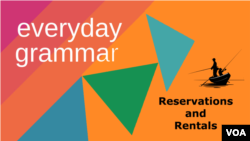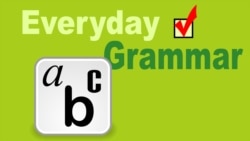This week on Everyday Grammar, we learn some of the grammar you need to talk about getting the things you need while on vacation.
A common summer vacation might involve a trip to a beach or a lake.
Going to a lake
Let’s say we are going to Big Bear Lake in California for a week.
Because I am describing my plans like a story, I will use only the present tense. Here is how I would plan our trip:
The first thing we should do is find out where we can stay. My family loves camping, so I looked for a campground. On the Big Bear Lake website, it says Pine Knot Campground is good for families. Hiking and mountain biking trails are nearby. So, I call and make a reservation for a campsite, a place to put up our tent. Here is how the call begins:
“I’d like to reserve a campsite at Pine Knot Campground for the last week of July.”
The verb “reserve” means to arrange to use something at a later date. It is a transitive verb, so you need an object. In this case, the object is “a campsite.” The reservation manager asks me some questions:
“Do you want a tent or RV space?
How many people are in your party?”
The expression, “in your party” means the number in your group. An “RV” or recreational vehicle is a camping vehicle, often with a bed and kitchen. I answer:
“I want a tent space for five people.”
I learn that the cost will be $42 a night. You might hear “per night” or “a night” when you make a reservation to sleep in a place. I give my credit card number to the manager to make the reservation and she says I will get an email “confirmation.” Usually, a confirmation is a number or a printed code that shows you have made a reservation.
Price difference
With the campsite reserved, the next thing I need to do is to find mountain bike rentals. My family likes to ride bicycles in the woods, but we cannot bring our bicycles to the lake. I find a few sports shops on Big Bear Boulevard near the park. I call to see if I can rent bikes from them:
“I’d like to rent five mountain bikes for the last week of August.”
Note that I do not ask to borrow the bikes because I am paying to use the bikes, so I am renting them. The clerk at the shop asks:
“Kids or adults? And do you want pedal or electric ones? There are a lot of hills around here.”
I had not thought about using an electric bike. It would make biking in the mountains easier. But I need more information, so I ask:
“I need three kid’s bikes and two adult bikes. What is the price difference between pedal and electric?”
The clerk answers:
“Pedal is $48 a day, and electric is $120 a day. We only have electric in the adult size, though.”
The price helps me to decide. Because $120 a day is a very high daily rate. We will pedal!
Package offers
After I finish renting the bikes, there is just one more thing to plan – what will we do on the lake? I heard there are lots of water sports at Big Bear. I find a web page for the marina, the place where boats are kept. It says they have many different kinds of boats available for rent. A quiet day fishing on the lake is my family’s idea of a good time. So, I call to find out about renting a fishing boat:
“Do you rent boats and fishing gear together?”
The marina staff member answers:
“We have an all-included fishing package – that is, the boat, gear, bait and even lunch. How many people?”
This sounds like a good “package.” Businesses offer a “package” deal when one price covers a number of things that would normally be sold separately. “Gear” is a general word for everything you might need for an activity. For fishing, it means a pole, hooks and line, and a life jacket. I answer:
“Five. How much is it for the whole day?”
I learn it is $200 for the boat and $25 for the gear. I arrange to rent the boat and make a note to be sure to bring sunscreen and sun hats for everyone.
Planning ahead
In this lesson, we use some common expressions that you will hear when making reservations and renting things. They are: to reserve, to make a reservation, confirmation, a night or per night, a day, price difference, package, and gear. Put these into use and you can plan your own vacation trip.
Learning about all of these rental and reservation costs a month or two before our vacation makes me think – planning ahead for a vacation is a good idea. Now, I will not be surprised by extra costs, and I will enjoy the time with my family. I hope you enjoy your vacation, too.
And that’s Everyday Grammar!
I’m Jill Robbins.
Jill Robbins wrote this lesson for VOA Learning English.
________________________________________________
Words in This Story
hike – v. to walk a long distance, especially for pleasure or exercise
tent – n. a portable shelter that is used outdoors, is made of cloth (such as canvas or nylon), and is held up with poles and ropes
pedal – n. a flat piece of metal, rubber, or the like that you push with your foot to make a machine move, work, or stop
credit card – n. a small plastic card that is used to buy things that you agree to pay for later
kid – n. a young person
bait –n. something that looks like something a fish would eat which is used to catch fish
pole – n. a long, straight piece of wood, metal, or the like
hook – n. a curved or bent tool for catching, holding, or pulling something
line – n. a long and thin rope, string, or the like
life jacket – n. something that is worn over your upper body like a jacket or vest and that is designed to save you from drowning by holding you up when you are in water
What kinds of things do you reserve or rent for your summer vacation? We want to hear from you. Please write to us in the Comments Section.






Forum